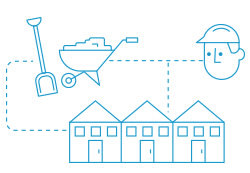If the residential building industry takes the temperature of the Australian economy, says Richard Stone, RSM Australia partner, Restructuring and Recovery, it is currently in dire need of medical attention.
“The building construction industry, almost irrespective of what cycle the market is in, seems to throw up a steady stream of insolvencies but, certainly in the residential home building space, I have never seen it this acute,” says Richard, based in Sydney.
With pressures on the industry expected to continue, there are ways, however, for directors to navigate a pathway.
WHY IS THE HOUSE BUILDING INDUSTRY IN CRISIS, RICHARD? WHAT IS GOING ON?
Many home builders operate on a high-volume, low-margin model. Often contracts with Mum and Dad buyers are fixed price, without any ratchet clause to deal with market fluctuations. Couple this with trade shortages and external factors - plus the fact that there is sometimes a gap of 12 months between signing contracts and getting on site to commence the build - builders’ bottom lines are depreciating more and more.
WHAT ARE THOSE EXTERNAL FACTORS EXACERBATING THE CRISIS?
Increasing energy costs due to the war in Ukraine, disruption in international logistics supply chains, the rising cost of building materials, the increase in interest rates, rising inflation as well as a significant skilled labour shortage. Also, a reduction in demand in the housing market, and falling property prices, particularly in Sydney and Melbourne. Combine this with having no way to recoup increasing building costs, and more builders are facing the real possibility of becoming insolvent.
WHAT ACTIONS ARE AVAILABLE TO RESIDENTIAL BUILDERS TO ENSURE THEY AVOID THIS GRIM PROSPECT?
Certainly, fixed-price contracts are a significant structural problem for smaller building companies. There is no magical solution other than employing greater foresight to include a rise and fall provision, a ratchet clause in your sales contracts to accommodate increasing costs. This, in the very least, will provide some level of margin protection.
WHAT IS SYMPTOMATIC OF A RESIDENTIAL BUILDING COMPANY IN FINANCIAL DIFFICULTY?
Cash flow difficulty, for starters. Also, falling behind in payments to the Australian Taxation Office. Clients or debtors who are having difficulty paying, are slow to pay or have fallen over themselves, which in turn has had a knock-on effect to your business. These are all red flags.
THOSE FLAGS MUST BE CONFRONTING FOR A DIRECTOR TO ACKNOWLEDGE.
Absolutely - especially when it’s a family building business, and the family may have been supporting the business for a very long time as its major creditor. It’s always difficult for directors who are emotionally invested, especially when many of the workforce have been with them for years. The vital point here is to reach out for help to see if there are any changes or improvements that can be made to operations to rectify the issues. And do it now. Time is of the essence.
WHY IS GETTING HELP PARTICULARLY TIME SENSITIVE IN THIS ECONOMIC CLIMATE?
Because early intervention gives choices to struggling home builder companies. We look at the business model, profit and loss, cost structure and the management team and its capabilities. This means we can then advise on the best way forward. Like advising directors to sign up to the safe-harbour provisions, relatively new legislation which ensures independent legal and restructuring advice, and that directors will not be held financially responsible, if terms are met, for business insolvency.
WHAT ARE OTHER OPTIONS THAT CAN BE CONSIDERED?
We can also look at the sale of the business as a going concern. While that might not be the preferred option, it is only possible by early engagement while a business still has some profits, and a profit margin with various building projects at varying stages of completion in the pipeline.
WHAT’S THE BEST-CASE SCENARIO?
The best outcome is always no formal appointment, such as a voluntary administration, which is a very public and expensive procedure. Here at RSM, we help our clients with successful turnaround strategies, but there must be some business and assets left to turn around. Unhappily, in the residential building industry in Australia right now, we are seeing company directors leaving the situation too late, when there are no options left but liquidation.
FOR MORE INFORMATION
Start a confidential, free conversation with our RSM Restructuring and Recovery team today contact your local adviser.






